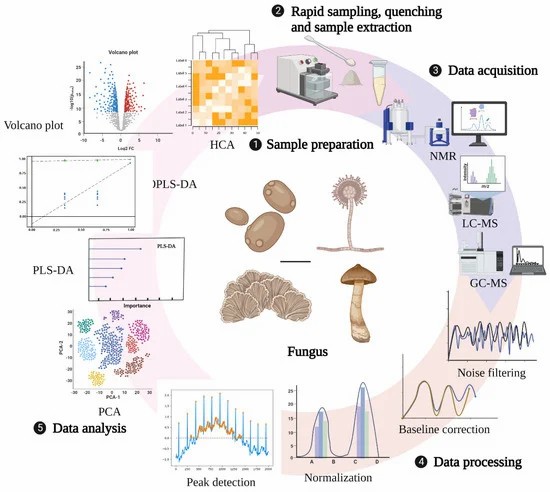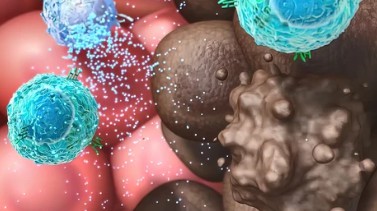Metabolomics is a new discipline that emerged after genomics, transcriptomics, and proteomics. Metabolomics is the quantitative and qualitative analysis of all metabolites produced by an organism or cell to visualize the changes in the organism during a certain process. In recent years, metabolomics techniques have been gradually applied to edible and medicinal mushrooms to study metabolic profiles, including sample extraction, metabolite isolation and analysis, data processing and analysis, and result description. Various active metabolites of mushrooms, such as polysaccharides, proteins and peptides, terpenes, phenolic compounds, polyunsaturated fatty acids, carbohydrates, lipids, and several other unknown metabolites, are beneficial to human health.
 Fig. 1. General technical route of metabolomics. (Li G et al., 2022)
Fig. 1. General technical route of metabolomics. (Li G et al., 2022)
Services

Lifeasible offers comprehensive non-targeted mushroom metabolomics services to measure metabolites of one or more related metabolic pathways and to analyze the patterns of metabolite changes following stimulation or disturbance in mushrooms. Our experts are committed to screening more mushroom metabolic markers and developing targeted metabolomics techniques to analyze the metabolic networks and production mechanisms of these markers. We can map the complete regulatory network of mushroom material and energy metabolism.
We have successfully performed metabolomics analyses on mushrooms such as Cordyceps bassiana, Phanerochaete chrysosporium, T. versicolor, Dichomitus squalens, P. ostreatus, and D. indusiata, etc. Our mushroom metabolomics services are mainly related to the following research areas:
Application of Metabolomics to Mushroom Taxonomic Identification
Morphological methods have limitations as traditional methods of mushroom classification. We use sequence and metabolomics-based chemotaxonomic comparative analysis of secondary metabolites of different mushrooms to identify mushroom species. This metabolomics approach to identifying mushrooms is less time-consuming, faster, and consistent with quality control for large-scale production.
Application of Metabolomics to Mushroom Stress Response
Mushroom cultivation is susceptible to biological stress, nutritional stress, oxidative stress, heat stress, and cold stress. We provide metabolomics techniques to analyze the changes in endogenous metabolites produced by mushrooms affected by environmental factors, which can help mushroom breeding.
The edible and medicinal value of mushrooms comes from the fact that they contain many specific bioactive substances such as polysaccharides, alkaloids, terpenoids, sterols, and proteins. Mass spectrometry-based metabolomics workflows allow us to simultaneously screen hundreds of mushroom species for the extraction of bioactive compounds as well as to explore potentially useful secondary metabolites.
We can analyze the patterns of mushroom metabolites and potential maturation indicators of mushroom metabolites in different environments and developmental stages.
Our Metabolomics Technology Platforms
- Nuclear magnetic resonance (NMR)
- Gas chromatography (GC/MS)
- High-performance liquid chromatography (HPLC-MS)
- Capillary electrophoresis
- Non-targeted techniques
We will select the best combination of methods according to the different research objectives of our clients. Our mushroom metabolomics services can be used for different purposes and have become an essential complement to genomic, transcriptomic, and proteomic technologies. If you are interested in our services, please contact us.
Reference
- Li G, Jian T, Liu X, et al. (2022) Application of Metabolomics in Fungal Research[J]. Molecules. 27(21): 7365.
For research or industrial raw materials, not for personal medical use!


 Fig. 1. General technical route of metabolomics. (Li G et al., 2022)
Fig. 1. General technical route of metabolomics. (Li G et al., 2022) 
